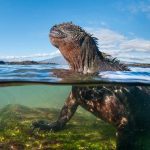
Scientific American: Could Genetic Engineering Save the Galápagos?
Campbell first became intrigued by the possibilities of gene drive in 2011, when he sat in on a conference call between biologists at NC State University and officials of the U.S. Fish and Wildlife Service to discuss a possible genetic approach to control a runaway mouse problem on Southeast Farallon Island, about 20 miles west of the California coast, near San Francisco. John Godwin, a North Carolina State neurobiologist who studies animal behavior, had learned of the Farallon issue while skimming the Internet in 2011. He happened to be at a university with an established infrastructure dedicated to experimenting with—and considering the ethical implications of—genetic manipulation....Continue reading "Scientific American: Could Genetic Engineering Save the Galápagos?"
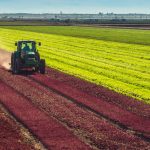
Science: Trump’s agriculture department reverses course on biotech rules
It’s a predictable move by President Donald Trump’s White House to take another look at the policies of the previous administration, says Jennifer Kuzma, a social scientist who co-directs the Genetic Engineering and Society Center at North Carolina State University in Raleigh. “I expected them to eventually catch wind that this was something that USDA was doing, and reverse it.”...Continue reading "Science: Trump’s agriculture department reverses course on biotech rules"
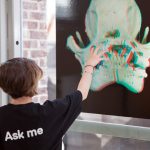
Our (Possible) Genetic Futures
As crowds poured into Raleigh’s contemporary art museum during the April 2017 art walk, one white wall began to fill with hand-written messages scribbled on neon Post-It notes. Above was a sign: Write down one word describing how you feel about your genetic future....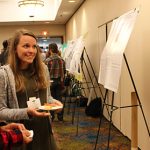
IGERT Student Jessica Barnes wins poster contest at 2017 American Chestnut Foundation meeting
Read about the ACF Annual Meeting and see more photos here. Full poster (click to enlarge)...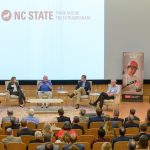
U.S. Secretary of Agriculture Brings Listening Tour to NC State
A multi-state listening tour brought Sonny Perdue to NC State University, where he heard repeatedly about the importance of communicating with and educating the public about the importance of agricultural innovation to rural prosperity....Continue reading "U.S. Secretary of Agriculture Brings Listening Tour to NC State"
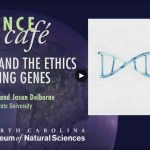
Godwin and Delborne discuss CRISPR and ethics at NC Museum of Science
GES faculty John Godwin and Jason Delborne were at the NC Museum of History on 9.28.17 discussing genetic biocontrol of pest populations, such as CRISPR gene drives to eliminate invasive rodents from islands to protect endangered seabirds. See PowerPoint presentation & livestream video (including slides)....Continue reading "Godwin and Delborne discuss CRISPR and ethics at NC Museum of Science"

Scientific American article on public acceptance of CRISPR features Delborne and Kuzma
“Without transparency, we might see a kind of hyperpolarization,” says Jason Delborne, a professor of science, policy and society at North Carolina State University. Concerned groups will feel marginalized, and advocates won't receive critical feedback needed to improve design and safety. “This puts the technology at risk of a knee-jerk moratorium at the first sign of difficulty,” he notes....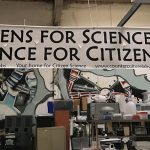
Upgrading Biosafety and Biosecurity: Open Philanthropy awards $700K for DIYbio
“For the last six years, Todd and I have been exploring the best ways to ensure the healthy growth of community labs as safe and secure resources for public education and biotech innovation,” says Grushkin. “This grant will help us codify best practices in these often unconventional spaces.”...Continue reading "Upgrading Biosafety and Biosecurity: Open Philanthropy awards $700K for DIYbio"
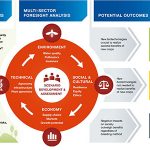
Kuzma examines benefits, regulation of gene edited crops in EMBO
In this article, published by EMBOpress, researchers look at how new genetic-engineering (GE) technologies based on gene editing can help to generate crop varieties to address critical challenges in agricultural development. However, governance systems for these crops are poorly defined and currently uncertain....Continue reading "Kuzma examines benefits, regulation of gene edited crops in EMBO"
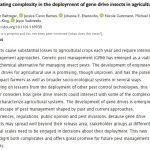
GES IGERT Students Research Deployment of Gene Drive Insects
A new paper from GES IGERT students, to be published by the Journal for Responsible Innovation, is now available online. Anticipating complexity in the deployment of gene drive insects in agriculture Jennifer Baltzegar, Jessica Cavin Barnes, Johanna E. Elsensohn, Nicole Gutzmann, Michael...Continue reading "GES IGERT Students Research Deployment of Gene Drive Insects"
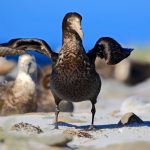
NC State Receives DARPA Funding to Develop, Test Gene Drive System
For Immediate Release August 3, 2017 John Godwin | 919.513.2936 North Carolina State University researchers have received funding from the Defense Advanced Research Projects Agency (DARPA) to develop and test a system that would reduce populations of...Continue reading "NC State Receives DARPA Funding to Develop, Test Gene Drive System"
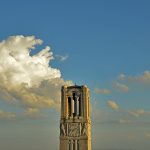
NC State Receives DARPA Funding to Develop, Test Gene Drive System
Developing and testing a gene drive system to reduce invasive mouse populations is the focus of a DARPA-funded research project....Continue reading "NC State Receives DARPA Funding to Develop, Test Gene Drive System"
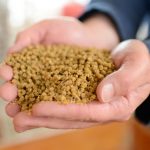
CALS, Premex Build Synergistic Relationship
An NC State partnership with international animal nutrition company extends beyond workforce development to research sponsorship and philanthropy....Continue reading "CALS, Premex Build Synergistic Relationship"
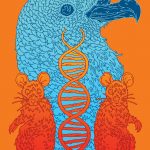
GES Co-Directors Gould and Kuzma Quoted in Audubon Story on Using Gene Drives to Save Island Birds
A new story in Audubon Magazine, How Genetically Modified Mice Could One Day Save Island Birds, features quotes from GES Co-Directors Dr. Fred Gould and Dr. Jennifer Kuzma. The article tells the story of how Dr. John Godwin, Associate Professor of Biological Sciences, and Ph.D. student Megan Serr became part of GBIRd (Genetic Biocontrol of Invasive Rodents), a global partnership working to save island birds from extinction by using the cutting-edge (and controversial) CRISPR and gene drive technologies to eradicate invasive species of mice....